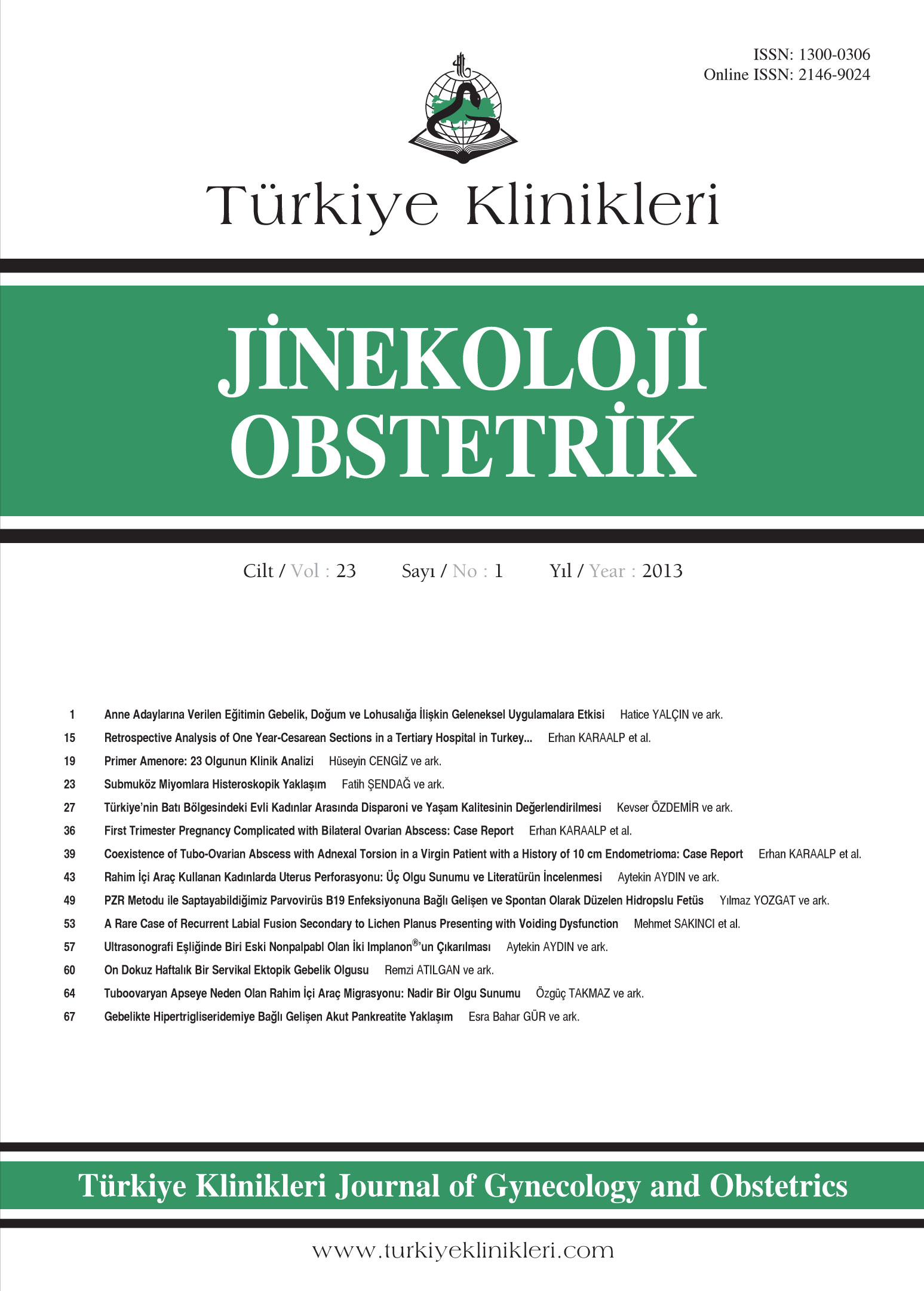Open Access
Peer Reviewed
CASE REPORTS
3371 Viewed1175 Downloaded
Transient Hydrops Fetalis Secondary to Parvovirus B19 Infection Diagnosed Through PCR Methods: Case Report
PZR Metodu ile Saptayabildiğimiz Parvovirüs B19 Enfeksiyonuna Bağlı Gelişen ve Spontan Olarak Düzelen Hidropslu Fetüs
Turkiye Klinikleri J Gynecol Obst. 2013;23(1):49-52
Article Language: TR
Copyright Ⓒ 2025 by Türkiye Klinikleri. This is an open access article under the CC BY-NC-ND license (http://creativecommons.org/licenses/by-nc-nd/4.0/)
ÖZET
Parvovirüs B19 (PVB19) enfeksiyonuna ikincil gelişen nonimmün hidrops fetalis fetal kayıba yol açabilecek kadar şiddetliden, spontan rezolüsyon gösteren hafif şekline kadar değişik klinik bulgularla karşımıza çıkabilir. Pozitif maternal B19-immünglobulin (Ig)M titresi yakın zamanda geçirilmiş PVB19 enfeksiyonu için yüksek bir duyarlılığa sahiptir, ancak IgM titresi hastalığın başlangıcından sonra hızla düşebilir. Biz bu çalışmada, spontan olarak düzelen PVB19 enfeksiyonuna ikincil gelişen annede negatif PVB19- IgM antikor titresi bulunan nonimmün hidrops fetalisli nadir bir olguyu sunduk. Yirmi beş yaşında ilk gebeliği olan anne, 23 haftalıkken nonimmün hidrops fetalis tanısıyla kliniğimize sevk edildi. Fetuste hafif derecede asit, bilateral plevral effüz ve perikardiyal effüzyon şeklinde hidrops bulguları saptandı. PVB19 için yapılan serolojik değerlendirmede spesifik IgG pozitif ve IgM negatifti, Ancak annenin iki hafta önce eritema enfeksiyozum benzeri döküntü, hafif ateş, eklem ağrısı ve baş ağrısı şeklinde semptomları olduğu saptandı. Maternal kanda polimeraz zincir reaksiyonu (PZR) ile PVB19 DNA'sı arandı ve pozitif saptandı. Ultrasonografik izlemde 21 gün içinde hidropsu spontan olarak düzeldiği izlendi. Sonuç olarak, kuşkulu serolojik sonuçları olan olgularda PVB19 enfeksiyonu tanısı PZR yöntemiyle PVB19-DNA'sı aranarak doğrulanmalıdır.
Parvovirüs B19 (PVB19) enfeksiyonuna ikincil gelişen nonimmün hidrops fetalis fetal kayıba yol açabilecek kadar şiddetliden, spontan rezolüsyon gösteren hafif şekline kadar değişik klinik bulgularla karşımıza çıkabilir. Pozitif maternal B19-immünglobulin (Ig)M titresi yakın zamanda geçirilmiş PVB19 enfeksiyonu için yüksek bir duyarlılığa sahiptir, ancak IgM titresi hastalığın başlangıcından sonra hızla düşebilir. Biz bu çalışmada, spontan olarak düzelen PVB19 enfeksiyonuna ikincil gelişen annede negatif PVB19- IgM antikor titresi bulunan nonimmün hidrops fetalisli nadir bir olguyu sunduk. Yirmi beş yaşında ilk gebeliği olan anne, 23 haftalıkken nonimmün hidrops fetalis tanısıyla kliniğimize sevk edildi. Fetuste hafif derecede asit, bilateral plevral effüz ve perikardiyal effüzyon şeklinde hidrops bulguları saptandı. PVB19 için yapılan serolojik değerlendirmede spesifik IgG pozitif ve IgM negatifti, Ancak annenin iki hafta önce eritema enfeksiyozum benzeri döküntü, hafif ateş, eklem ağrısı ve baş ağrısı şeklinde semptomları olduğu saptandı. Maternal kanda polimeraz zincir reaksiyonu (PZR) ile PVB19 DNA'sı arandı ve pozitif saptandı. Ultrasonografik izlemde 21 gün içinde hidropsu spontan olarak düzeldiği izlendi. Sonuç olarak, kuşkulu serolojik sonuçları olan olgularda PVB19 enfeksiyonu tanısı PZR yöntemiyle PVB19-DNA'sı aranarak doğrulanmalıdır.
ANAHTAR KELİMELER: Hidrops fetalis; parvovirüs B19, insan
ABSTRACT
Nonimmun hydrops secondary to parvovirus B19 (PVB19 V) infection can manifest as severely as fetal death to as mild as spontaneous resolution. A positive metarnal PB19V-IgM titer has a high sensitivy for recent PB19 V infection, but its levels can decrease rapidly after the onset of disease. We presented here, a rare case of transient hydrops fetalis secondary to PVB19 İnfection with negative maternal PB19 V-IgM antibodies. A 25-years-old primigravida was referred to our institute at 23 weeks gestation with nonimmun hydrops fetalis. The fetus was noted to be hydropic with middle ascites, bilateral pleural effusion and pericardial effusion. Serological evaluation for PVB19 V indicated positive of specific IgG and negatif of IgM antibody, but the mother had symptomps such as erythema infectiosum, mild fever, arthralgia and headache two weeks ago. Maternal blood examined PVB19 V-DNA detection by PCR and PVB19 V DNA was positive. Ultrasonography revealed spontaneous resolution within 21 days. In conclusion, fetal PVB19 V infection should be confirmed to PVB19-DNA detection by PCR in cases of doubtful serological results.
Nonimmun hydrops secondary to parvovirus B19 (PVB19 V) infection can manifest as severely as fetal death to as mild as spontaneous resolution. A positive metarnal PB19V-IgM titer has a high sensitivy for recent PB19 V infection, but its levels can decrease rapidly after the onset of disease. We presented here, a rare case of transient hydrops fetalis secondary to PVB19 İnfection with negative maternal PB19 V-IgM antibodies. A 25-years-old primigravida was referred to our institute at 23 weeks gestation with nonimmun hydrops fetalis. The fetus was noted to be hydropic with middle ascites, bilateral pleural effusion and pericardial effusion. Serological evaluation for PVB19 V indicated positive of specific IgG and negatif of IgM antibody, but the mother had symptomps such as erythema infectiosum, mild fever, arthralgia and headache two weeks ago. Maternal blood examined PVB19 V-DNA detection by PCR and PVB19 V DNA was positive. Ultrasonography revealed spontaneous resolution within 21 days. In conclusion, fetal PVB19 V infection should be confirmed to PVB19-DNA detection by PCR in cases of doubtful serological results.
MENU
POPULAR ARTICLES
MOST DOWNLOADED ARTICLES





This journal is licensed under a Creative Commons Attribution-NonCommercial-NoDerivatives 4.0 International License.










